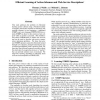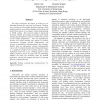197 search results - page 12 / 40 » Using Reinforcement Learning to Spider the Web Efficiently |
108
click to vote
SIGIR
2003
ACM
15 years 7 months ago
2003
ACM
Most existing clustering algorithms cluster highly related data objects such as Web pages and Web users separately. The interrelation among different types of data objects is eith...
116
click to vote
JAIR
2011
14 years 9 months ago
2011
Markovian processes have long been used to model stochastic environments. Reinforcement learning has emerged as a framework to solve sequential planning and decision-making proble...
AAAI
2008
15 years 4 months ago
2008
This work addresses the problem of efficiently learning action schemas using a bounded number of samples (interactions with the environment). We consider schemas in two languages-...
116
click to vote
HICSS
2005
IEEE
15 years 7 months ago
2005
IEEE
The study investigates the impact of weblog use on individual learning in a university environment. Weblogs are a relatively new knowledge sharing technology, which enables people...
110
click to vote
ATAL
2008
Springer
15 years 4 months ago
2008
Springer
In reinforcement learning, least-squares temporal difference methods (e.g., LSTD and LSPI) are effective, data-efficient techniques for policy evaluation and control with linear v...


